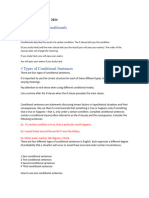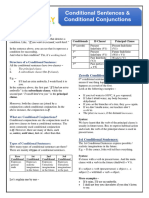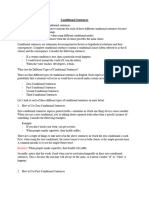0% found this document useful (0 votes)
32 views1 pageShort Lecture On Conditional Sentences
Conditional sentences describe a condition and its result, typically using 'if' to connect two parts. There are four types: Zero Conditional (facts), First Conditional (real future situations), Second Conditional (imaginary present/future), and Third Conditional (imaginary past situations). Common rules include using a comma after the 'if' clause when it comes first and practicing these sentences in daily conversations to improve fluency.
Uploaded by
ayeshalove6396Copyright
© © All Rights Reserved
We take content rights seriously. If you suspect this is your content, claim it here.
Available Formats
Download as DOCX, PDF, TXT or read online on Scribd
0% found this document useful (0 votes)
32 views1 pageShort Lecture On Conditional Sentences
Conditional sentences describe a condition and its result, typically using 'if' to connect two parts. There are four types: Zero Conditional (facts), First Conditional (real future situations), Second Conditional (imaginary present/future), and Third Conditional (imaginary past situations). Common rules include using a comma after the 'if' clause when it comes first and practicing these sentences in daily conversations to improve fluency.
Uploaded by
ayeshalove6396Copyright
© © All Rights Reserved
We take content rights seriously. If you suspect this is your content, claim it here.
Available Formats
Download as DOCX, PDF, TXT or read online on Scribd
/ 1
























































